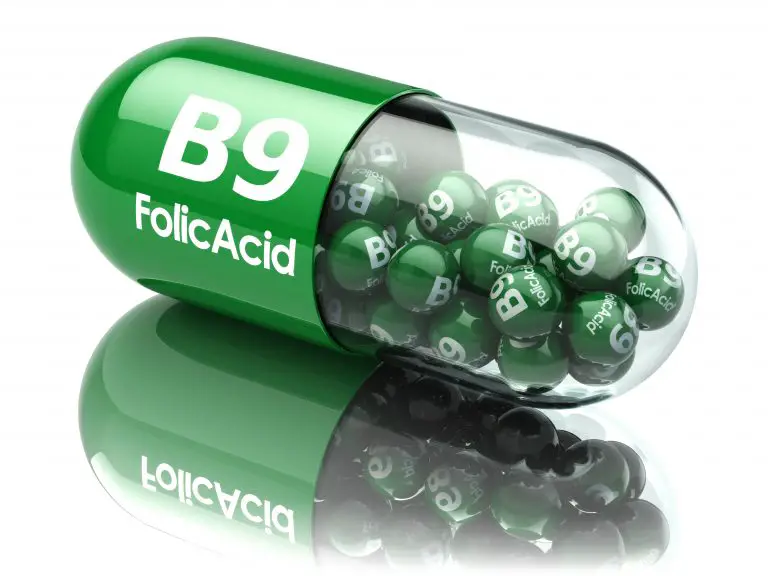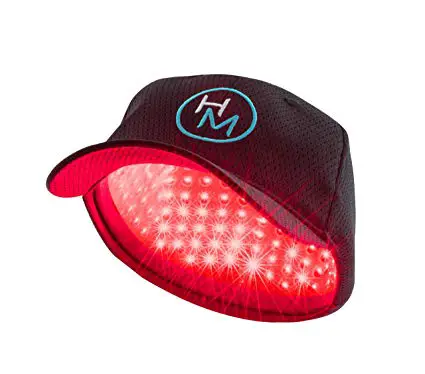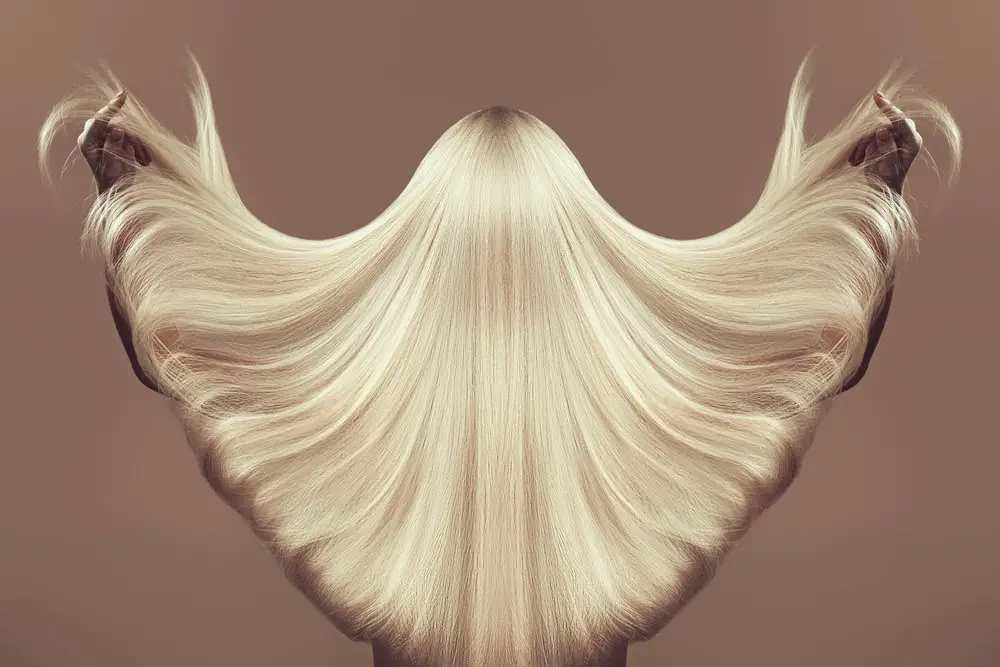
Page Contents
Folic acid is a hair loss treatment that I hope that you have heard about. If you haven’t heard how amazing this vitamin is for your hair, now is the time to look into it. First, we are going to see what folic acid is, and then explain how good it is for you.
About Folic Acid
Folic acid is also sometimes referred to as Vitamin B9, and it is one of the B vitamins that makes up the B complex. It is also, more rarely, called folate, folacin, or even pteroyl-L-glutamic acid. Though folate technically is folic acid, there are actually differences between these two.
Essentially, folate is the natural form of folic acid as it is found in foods. When you digest it, the folate becomes folic acid. Most supplements have folic acid, not folate, even though it is easier for your stomach to absorb the folate.
One thing about getting folate from food as your folic acid is that cooking can break down the folate. This prevents you from getting any folic acid from it, which is one reason why you might be missing some of what you need. Folic acid is, therefore, one more reason why you should include plenty of raw foods in your diet.
As for what folic acid does for you, there are too many things to name them all. This unique vitamin is required for the creation of new cells and tissues, the repair of your DNA, and the coding of the proteins that are used as building blocks in your body.
Each one of those functions is every bit as important as it sounds. This is why folic acid is considered one of the vital nutrients that your body needs in order to properly function. Not getting enough folic acid in you can result in all manner of health problems.
Finally, one last thing about folic acid to note is that it eventually gets metabolized by the liver. This converts it into dihydrofolic acid. This acid is broken down further, and it is then used to make one of the building blocks of your DNA.
Benefits Of Folic Acid
Besides all of the necessary functions of folic acid, ensuring that you get enough also comes with other benefits. Just a few of these folic acid benefits are: better immune function, better energy, mood and hormone balance, and a decrease of inflammation.
Folic acid may be a huge help to your hair, but it also helps other parts of your body. First, this vitamin also helps your heart. It does this by metabolizing something called homocysteine into amino acids. This not only gives you more amino acids, which is always nice, but it gets rid of some of the homocysteine, which can cause any number of problems and especially heart problems.
Homocysteine also is something that can lead to strokes, so your chances of that get decreased as well. This is in addition to the new amino acid’s help against cancer, and the fact that folic acid is good for your cholesterol levels and those with diabetes.
One area where folic acid shines has to do with your brain. It can help prevent common brain diseases like Alzheimer’s and dementia, as well as depression and chronic stress. The neural support that this vitamin gives is excellent, even helping with things like macular degeneration.
Some other, slightly more random benefits of folic acid includes fertility for men, a smaller chance of pre-eclampsia and other complications for pregnant women, and a lower chance of cervical cancer in particular.
In addition, there is its help with chronic kidney disease and its effect on high blood pressure. Folic acid strengthens your bones, prevents anemia by helping you make new blood, and is great for strengthening your gums. This last one it does by preventing gingivitis and helping with plaque and other things.
For Hair
While many of those things assist your hair growth indirectly, folic acid can also offer more direct help to your hair. One of the first things that I mentioned folic acid helps with is inflammation. This benefit is particularly advantageous for hair growth, which is severely hindered by any amount of inflammation.
But, even aside from the help with inflammation, folic acid is vital to your hair, nails, and skin. After all, this acid makes up some of the proteins that your hair and nails are made of.
Folic acid also goes into making your red blood cells. These are the cells that move around nutrients and oxygen to wherever they are needed in your body. This includes supplying nutrients to your hair, as well as to your organs and anywhere else they are needed.
One thing to mention further is that your body needs to send nutrients places. If you are not able to circulate your nutrients efficiently, which folic acid helps with, then your hair suffers double. Not only is your hair last on the list of things your body cares for, but your body can make more testosterone to help with the circulation. This only makes your hair even worse off.
So, in short, folic acid can both lessen the inflammation and increase the nutrients going to your hair, making it the perfect hair loss treatment. And we already went over all that it does for the rest of your body.
How Much Folic Acid
Getting just the right amount of folic acid is very important. This vitamin is one of those that it can be just as damaging to have too much of it as it is to have too little. Therefore, caution when taking folic acid should be used.
Besides that, folic acid also has a few other issues that you should know about. If you increase your folic acid intake by taking a supplement or something, it can interfere with certain medications. Some of these include an antibiotic, an anti-seizure treatment, and one that is given as a preventive treatment of malaria. It can also be actually dangerous if you are taking chemotherapy for any reason.
Also, this deficiency can have some very similar effects to that of iron deficiency. Vitamin B12 is also important for some of the same things as folic acid, so deficiencies of one can sometimes be confused as the other. For this reason, most people who are deficient take both B9 and B12.
The right amount of folic acid can vary according to age, health, size, and any number of other things. So, sometimes looking for deficiencies and the signs that you might have too much can be helpful.
Too Little
There are a few signs of folic acid deficiency, just as there are signs that you might be getting too much. The deficiency signs can be any number of health problems. One sign is that it can trigger hair loss, but also having weak nails and dull skin can be signs of deficiency as well.
When your oxygen levels are low, your cells can increase your testosterone to help move things around. This increase is obviously bad for your hair. On the subject of hair, too little of the folic acid can also hinder cell division, which means that new hairs are not grown as quickly.
When the hairs fall out, the lack of folic acid means that new ones won’t come it. In addition, megaloblastic anemia can also be caused by this deficiency, which can cause premature graying.
More serious conditions, such as anemia, chronic diarrhea, tongue swelling, an irregular heartbeat, and others are all things that can be caused by a lack of folic acid. There can even be cognitive and neurological problems in kids are if the deficiency is severe enough and for an extended period of time.
Other, more minor folic acid deficiency signs are mouth ulcers, peptic ulcers, swollen tongue, menstrual problems. Since folic acid helps prevent certain birth defects, the presence of these defects can also be a sign of a deficiency. Two of these are anencephaly and spina bifida.
The main three causes of having too little folic acid are: poor diet, a medical condition – such as one that prevents you from properly absorbing nutrients, and certain medications. Some examples of medications that can interfere with your folate absorption are anti-inflammatory pills, anti-seizure medications, antacids, and others. As mentioned, folic acid can interfere with medications as well.
Too Much
Since your body can store up some folic acid for later use, it is hard to get too much of it. However, it is completely possible to have too much folic acid. Not drinking enough water while having too much folic acid is particularly dangerous.
Too much folic acid doesn’t get metabolized properly. This unmetabolized folic acid (UMFA for short) can build up in your system. This can cause problems like an impaired immune system, certain cancers, lower iron levels, slower cognition, and impaired memory.
But that is long-term. Short-term effects of too much folic acid include things like headaches, rashes, nausea, and a variety of possible skin reactions.
Related Reading
How To Use Folic Acid For Your Hair
First and foremost, folic acid is meant to be ingested. As we have seen, folic acid is used all over your body. To get this acid to those places, you are going to have to take it internally. Eating the right foods with folate in them is obviously the best place to start.
Some of these foods include spinach, avocado, beans, legumes, nuts, peas, bananas, oranges, lemons, grapefruits, and other citrus fruits. Just remember that these must not be cooked if you want the folate in them.
If, for whatever reason, eating folate is not an option for you, try to get a supplement that has folate in it instead of folic acid. It is hard for your body to absorb folic acid, and much easier to absorb the folate and turn it into the folic acid you need.
So, though it might seem backwards, go with folate over folic acid if you have a choice. Though folic acid is easier to find as a supplement, you can get folate as a supplement instead. However, some people with gene problems cannot turn the folate into the folic acid efficiently. These people should take the folic acid.
Since folic acid is so important, many foods are fortified with it to help you get what you need. Some of these include: pasta, rice, cereals, breads, and flours. The upper daily limit of folic acid that you should get is about 1000mcg, with 500mcg being a daily recommended amount.
Though taking folic acid internally is the best way to help your hair, you can use it other ways. If you like hair masks, add some folic acid to one so it can get directly to your hair. There is very little chance that your hair will actually absorb it this way, however.
Final Thoughts
Getting folic acid is clearly both important for your body and beneficial for your hair. However, along with taking folic acid, you should consider stopping any bad habits that could be using up the folic acid you get. For example, smoking, caffeine, and alcohol are all things that can actually decrease the levels of folic acids in you.
One final thing about folic acid you should know is that there are almost no studies for it. Lots of people using folic acid have gotten some amazing results for their hair. But there is as yet basically no scientific evidence backing folic acid as a hair growth treatment.
Still, considering the fact that folic acid, and folate, is easy to find and inexpensive to buy, it is well worth giving it a try.






